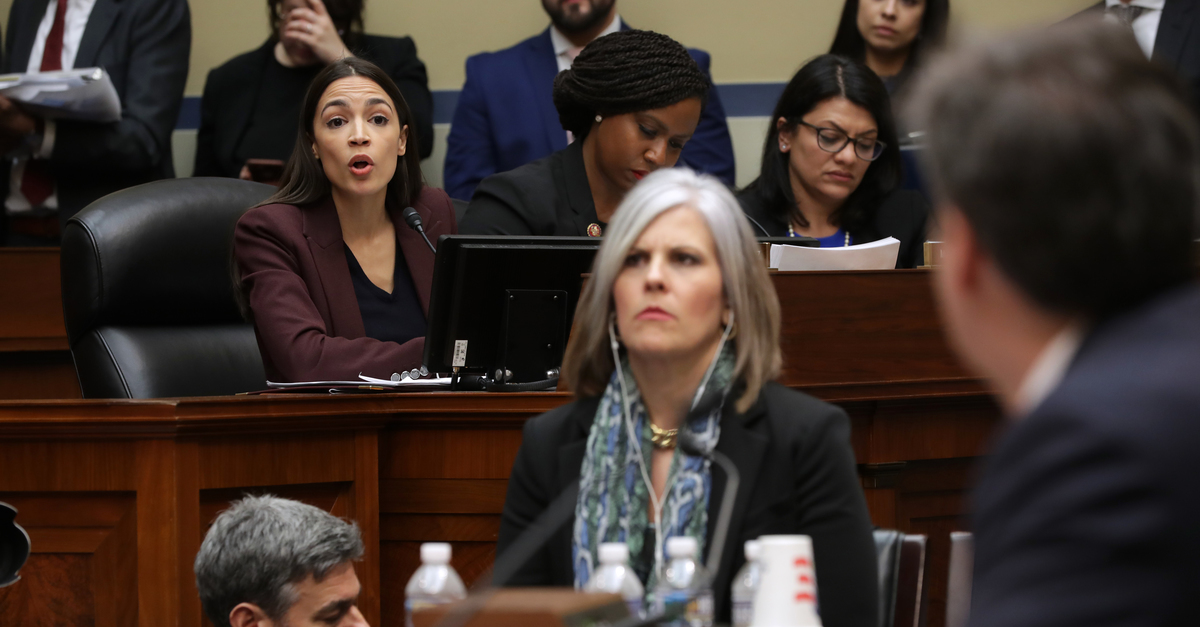
New York State’s ongoing investigation into whether the Trump Organization–and President Donald Trump himself–committed wire fraud is the result of congressional testimony elicited from Michael Cohen by Rep. Alexandria Ocasio-Cortez (D-N.Y.) in early 2019.
On Monday, New York Attorney General Letitia James filed renewed legal action against the 45th president’s businesses and his son, Eric Trump. The complaint requests that a state court force the defendants to comply with extant subpoenas demanding the release of sensitive financial information that may have been used to commit fraud. James also seek to compel Eric Trump’s testimony.
On February 27, 2019, Cohen appeared before the House Committee on Oversight and Reform to provide long-awaited testimony of his own about alleged crimes committed by his former friend and employer. Rep. Ocasio-Cortez was the lower chamber’s standout interrogator during that widely-viewed session.
The Bronx-based, self-described democratic socialist asked Cohen questions regarding exactly what James is currently requesting a court’s intervention to help obtain evidence of: alleged asset inflation to game insurance rates and property tax payments.
The exchange in question was just shy of 30 seconds:
AOC: To your knowledge, did the president ever provide inflated assets to an insurance company?
Cohen: Yes.
AOC: Who else knows that the president did this?
Cohen: Allen Weisselberg, Ron Lieberman and Matthew Calamari.
AOC: And where would the committee find more information on this? Do you think we need to review his financial statements and his tax returns in order to compare them?
Cohen: Yes. And you’d find it at the Trump Org.
The language used by Ocasio-Cortez and Cohen about asset inflation directly tracks with New York State’s recently renewed inquiry.
According to a legal memo prepared by the attorney general’s office to explain the statutory and precedential authority for enforcing those subpoenas in full, James is currently attempting to ascertain whether or not Trump and his various family businesses improperly inflated the value of assets “on annual financial statements in order to secure loans and obtain economic and tax benefits.”
James herself provided a clear-cut nexus between Ocasio-Cortez’s line of questioning and her own investigation in a Monday press release.
“New York Attorney General Letitia James this past Friday took legal action in an ongoing civil investigation into the Trump Organization’s financial dealings,” James’s office said. “Attorney General James opened an investigation into Donald Trump and the Trump Organization in 2019, after Trump’s former lawyer, Michael Cohen, testified before Congress that Trump’s annual financial statements inflated the values of Trump’s assets to obtain favorable terms for loans and insurance coverage, while also deflating the value of other assets to reduce real estate taxes.”
Notably, white collar criminal expert and federal defense attorney Tor Ekeland more or less predicted the precise impact of Ocasio-Cortez’s questioning at the time.
“Basically, the wire fraud statutes make it a federal crime to use any scheme or artifice to defraud if it’s done via any form of electronic communication like telephone, or the internet etc,” he told Law&Crime in an interview. “The important thing to note about the wire fraud and the bank fraud statutes is they’re extremely broad and you don’t actually have to have succeeded in committing the fraud you were trying to initiate. The second you’re communicating in interstate commerce–with a telephone or email, the wires– they’ve got you.”
Ekeland elaborated as to how it might apply in Trump’s case:
If he’s inflating his assets to get a better insurance rate or whatever, he’s using a scheme or artifice–which is the language of the statute–that’s arguably using a scheme or artifice to defraud the insurance company. He’s not just implicated in the substantive part of the statute but also the surrounding statutes like conspiracy to commit wire fraud, solicitation [to commit wire fraud] and maybe even accessory [to commit wire fraud] after the fact.
[image via Chip Somodevilla/Getty Images]